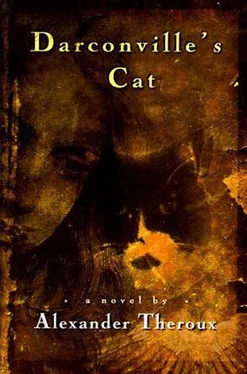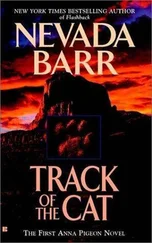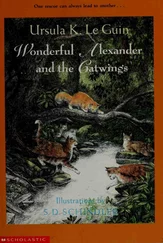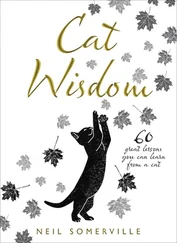Snap! Twing! Whirr! And to squeaks and squawks a sluice of twenty or so arrows — apterous some, most snapping off in slices and hooks — were released, heftily, in a fluttering of novice-like bowshots. No more than two or three hit the targets. Some flew sideways. Several twirled right around the bowstrings. And one deposited in a lateral whistle not four inches from Miss Ballhatchet’s manfully emplanted feet, whereupon, almost swallowing her whistle, she hopfrogged up with a piglike squeal.
“Beautiful!” she barked. “Oh, just beautiful!”
Each girl, her six shot, trooped out after her spent arrows, all of them waddling like dabchicks, stooping, wading around, hopping. The successful few dawdled at the targets, delaying the sweet necessity, for the benefit of all the others, and notably Miss Ballhatchet, of unplugging their shafts from the blue treble bed or the near-perfect red.
The archery class was almost finished, the grey light creeping slowly toward the west. A few more clouds bulled up in the northern sky, darkening, making it cooler.
From a distant knoll at the verge of the field, having strolled over after his classes, Darconville sat and watched the girls at play, trying at the same time to finish writing a letter, a deposition to the Venetian court, at least his tenth, in reply to various interrogatories touching on the litigation of his grandmother’s palazzo. It felt good to be outside. He hummed quietly, content in his solitude. The ritual across the archery field, a kind of dumb-show being acted out wordlessly, he sporadically studied: especially hirsute Miss Ballhatchet marching amphitheatrically to and fro, like Lady Paramount, waving her special self-nocked lemonwood bow and bellowing outraged but indistinguishable commands that reverberated off the dormitory wall of Clitheroe and shook out croaks of crows. A thought, with one of them, flew across Darconville’s head: onto a shaft the bird’s own feathers are grafted as fletches, and what must that bird think whose own quills, shafted and sped, strike it a fatal wound in mid-sky ?
The lesson down on the field continued. Miss Ballhatchet explained the technicalities of the Sioux Draw, the Mongolian Draw, the Pinch Draw. She fiddled out a timberhitch, dissertated on fletching glues, distinguished between various bow woods, and finally showed how to wax a string correctly, at which point — her breasts walloping up and down to the vigorous action — she told the girls they had damned well better stop laughing, stop immediately, she didn’t mean maybe, or someone was going to find herself with a fat lip, did they understand? — good!
“Now together,” clapped fit Miss Ballhatchet, “which eye do we sight with?” She placed her hand to her ear.
They shouted in unison: “ The right !”
“And on which side of the bow is the arrow placed?”
“ The left !”
So. Miss Ballhatchet marched down the landskip, turned, and blew her whistle; came the bellowed orders: “Position! Aim! Draw! Loose! — Loose, for godsakes !” But it was of a sudden a mis-exploded fireworks of tackle, shaft, feathers, and bows. Elsie Magoun overdrew. Martha Van Ramm didn’t anchor and wobbled her arrow. Twosie Kelter closed her right eye instead of her left and then looked up, at the cost of a bulbous thumb, too soon. Sheila Mangelwurzel’s shooting tab flew off. Grace Lerp’s nose wasn’t touching the string, her arrow spinning off like a pinwheel. One girl’s string — it was Bertha Tinkle— unlooped from the nock, and she sprang forward onto her head, tripping in a ricochet over her ground-quiver to a burst of laughter and, clattering her arrows, just missing a fatal impalement on one of the several parallel-pile target points sticking up. Sarah Lou Huckpath, never very bright, moronically jerked out her bow with a bending-load of such vengeance that it immediately went crackkk ! — and she just stood there, bewildered, holding it up like a poorly yerked wishbone. And fat little Millette Snipes, her abundant forearm unable to accommodate the conventional leather arm-guard, missed by seconds Miss Ballhatchet’s initially sage, but belated, howl—”You, your arm is kinked too far into the arrow!”—screamed, bent over double (no mean feat in itself), and then zigzagged off the field with her mouth open and a flaming welt on her inner arm the shape of a nasty smile.
“O my God!” groaned Miss Ballhatchet who threw her bow spinning into the air like a boomerang. “O my God! O my God! Will you all look at you?”
From afar Darconville watched the girls: their youthful and soft-sinewed bodies warm from activity, perfect, shaped to full and nubile curves within the close-fitting white uniforms, like Greek maidens, heedless of time, sporting on the ancient plains of Lyrcea. They weren’t all awkward. Several were quite efficient. They ingled their arrows into place, strained against their cinctures, and, leather-wristleted, with golden legs forming now to a wide stride, their valentine-shaped buttocks round and taut and full, they drew back their bowstrings slowly, the wings of their shoulder-blades peaking and tense in the sudden stasis, and then release— thwink! thwink! thwink ! — and it rained arrows, some dudding in short arcs, many jiggery-pokery, but, again, those distinct few whizzing into the targets with firm, authoritative splats. Defter than the others, more consistent, was one lustrous bow, drawing, releasing, and whistling arrow after arrow into the bullseye as if she owned it.
The archer?
It was Isabel Rawsthorne, the chaste huntress, a golden Phrygian in white tunic, her hair knotted behind in a bun of attic beauty by an oxhide thong. The girl, plainly sought after, wooed, admired, seemed to breed idolatry among her classmates who consistently coupled up to her for conversation. She was the best in the field. Everyone knew it, the students, the teacher. Oh, certainly the teacher. The teacher, indeed! As stared the famished eagle from the Digentian rock on a choice lamb that bounds alone before Bandusia’s flock Miss Ballhatchet stared on Isabel.
Darconville, even at that distance, isolated her and watched her graceful movements — she worked as dexterously as a Mede, a Scyth, a Lycian. He could almost feel the sweet perspiration on the glistening down of her cobnut-colored arms, flushed with each triumph, shot after shot. Splat! A gold. Splat! Splat! A red. A gold. Splat! A gold. So pleased was she that fit Miss Ballhatchet, otherwise aggressing from one to another to stay the trembling hand, to thread the wobbling shaft, to mutter an apt warning, never failed to circle this girl by the waist, take her to herself, and sapphonically whisper a soft word of praise into the belomant’s golden hair, as if to say with Kalliphonos of Gadara: “O love, thy quiver holdeth no more winged shafts, for all thine arrows are into me.”
The thought, however, was not Darconville’s. It couldn’t be: fate, as he took it, had long ago convinced him, if of the magic of earthly and mortal beauty, then also of its dangers. One, he knew, could not infer the existence of a reality which departed from the idea one had of it, and it was not enough to have the idea of a beautiful woman to conclude that it also existed. Gentle she seemed, breathtaking and mysterious, yes. A child of his daydreams, one glorious flower of many and glorious, a girl of fierce midnights and famishing morrows, no doubt, yes, yes, yes! But the artist’s love of beauty, he also knew, should be totally separated from his desire, no? Yes! And between the soul and its abilities who, that would look into the heart of all vision, would admit a difference?
Darconville, smiling, signed his letter, stuck it into an envelope, and getting up — he noticed it was becoming overcast now, the sky above the color of claret — walked like a stag around the far edge of the field toward the Quinsy post-office, but glancing back once in the direction of the archers, he thought he saw one particular girl, standing off from the group, turn and look up long at him across the expanse of green— an irradiated countenance that now, for a month or more, had shone upon him at sudden, heart-stopping, and unlooked-for moments, like spirits meeting air in air.
Читать дальше












